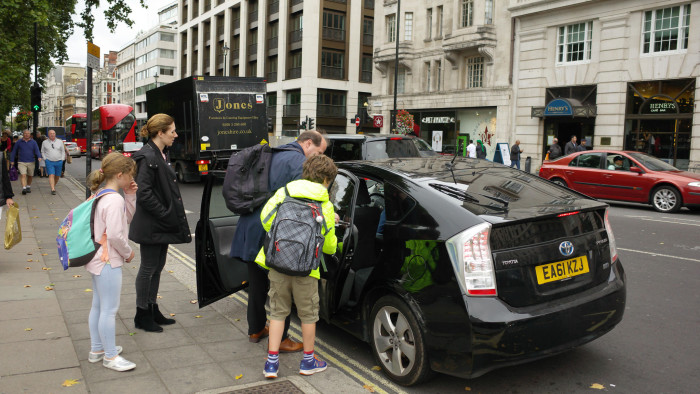Shell reverses car-hailing plans in London

Roula Khalaf, Editor of the FT, selects her favourite stories in this weekly newsletter.
Oil and gas giant Royal Dutch Shell made an unusual move last year in testing an Uber-style service in London, Europe’s biggest car-booking market.
But 18 months later, Shell has dramatically scaled back its plans, even as other car-hailing start-ups launch in London and investors plough money into the unprofitable sector.
“I think the lesson I learnt is that you’ve got to try these things,” said Roger Hunter, vice-president of digital ventures for Shell’s New Energies business. “But when they don’t work, pivot, and do it quickly.”
Shell’s decision not to launch the service highlights the gulf between fast-growing start-ups and older, more established companies, which have long been answerable to shareholders who expect investments to yield profits.
Oil and gas companies are currently preoccupied with understanding what the future of transport looks like. As the world shifts towards cleaner fuels and the threat looms of falling car ownership, energy majors such as Shell are trying to understand the implications for their businesses.
Shell’s FarePilot app began as a service for drivers on car-hailing platforms such as Uber who wanted to find “hotspot” areas where taxi demand was high. Not only would the app enable drivers to find journeys more quickly, but they could also “move more efficiently to the next job”, Mr Hunter said.
The company worked with the venture arm of Boston Consulting Group, which invests in and acts as an incubator for early-stage businesses, to launch the app, which was classified as a research and development project. Shell still spends the bulk of its annual capital spending budget on oil and gas.
But in July 2017, Shell filed an application with London’s transport authority so it could launch a separate service for linking drivers to other private-hire taxi companies, “almost like a dating app”, according to Mr Hunter. The service was envisioned as a business-to-business product, rather than the business-to-consumer model of Uber and Lyft.
“We couldn’t get it to work,” Mr Hunter said of the business-to-business service, adding that the company was unable to generate enough revenues under the planned business model.
“We are not doing that any more and we don’t need the licence any more,” he added.
FarePilot still offers certain services, such as the hotspot feature and a means to alert drivers to events in a particular area, but 24 people are currently working on the project, and the headcount is expected to fall, according to people briefed on the matter.
Car-hailing apps, including Uber and Lyft, have been heavily lossmaking as they spend generously to attract drivers and users away from rivals. In the run-up to Uber’s initial public offering earlier this year, executives sold the business as a once-in-a-generation opportunity to back a company with the potential to change transport but gave no indication when they expect to make a profit.
FarePilot interviewed about 100 drivers as part of the pilot to understand what difficulties car-hailing drivers face and what services Shell could potentially provide.
Kawser Ahmed, a 37-year-old driver for Uber, Kapten and ViaVan said he was invited to Shell’s Canary Wharf office under the impression that the company was developing an executive version of Uber. “They took my licence and details. Then they went silent,” he said.
Comments